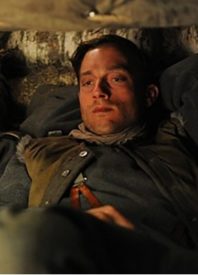
In reviewing Philipp Kadelbach’s Generation War, I’m going to do something that I dislike when others do it, and that is to digress and compare what I’m writing about to other works of media like it. But in fairness, this miniseries did have an ambition to make itself the German version of Band of Brothers, which reminds me that I’ll do the second thing I dislike when other writers do it and that is to write about a work I haven’t finished yet. You know where to send the hate mail, it’s been a while since I got one that was valid.
I have no idea if this is a bad reading of Band of Brothers, but that miniseries shows that than Allied victory was not a done deal even in February of 1945. Unlike Band of Brothers, Generation War is its own excellent beast and has an air of certainty with it (thankfully I’m back on topic). There’s a sense of doom hanging in the air as it captures five young people. They’re having a farewell party in the summer of 1941. They go on their separate ways, doing what they can do ensure a German victory by December. As we know, God, as well as the series’ writer Stefan Kolditz, have other plans.
The first two of the five friends are brothers Wilhelm (Volker Bruch) and Friedrich Winter (Tom Schilling). They make grim discoveries every mile they occupy in order to make Moscow fall. The more vicytories they make, the more war crimes they must witness. The third is Charlotte (Miriam Stein). She gets a nursing job probably because she gives the correct answers to a bad Aryan questionnaire. Their friend Viktor Goldstein (Ludwig Trepte) is a Jewish man walking around Berlin like nothing’s happening. And his girlfriend Greta (Katharina Schuttler) does everything to both protect him and further her singing career. These are two contradictory goals that sometimes makes sense through her actions.
Artworks depicting the Nazi era wax and wane in popularity. Every other film in 1993 was about the Holocaust or some kind of oppression. And going back to Band of Brothers, there were a lot of miniseries in the Bush era about the war, the Resistance, and the rise of Nazism for reasons I can’t fathom. Some viewers are discovering Generation War this year, more of them eventually doing so because of its release on OVID. However, this epic miniseries did not get the best reception from English language critics during its initial release.
Some of these critics pointed out that these characters’ idealism feels wink-y. That’s a fair assessment, sure, but that’s less interesting to me than Generation War‘s, or at least the pilot’s depictions of anarchy and authoritarianism. According to this series, anarchy isn’t The Purge series (or maybe it is) or Bakunin’s idea of how society works. Instead, anarchy is the performance of a normal society with authority. Meanwhile, its citizens bend the rules when no one’s looking. There’s a loud “Shalom” that Wilhelm screams joyfully to Viktor in public in Berlin in 1941. That “Shalom” is the biggest jolt I’ve felt in a while watching anything German.
Nonetheless, that anarchy is present while in opposition with its simpler but accurate depiction of authoritarianism. Here, authoritarianism a cloud that beats the series’ characters into submission. Of course it addresses Germany’s antisemitism, a belief that each character deals with in their own ways. The narration and the close-ups here are effective in displaying anguish, as closeups normally do. They capture people who are realizing that they are running out of rules to bend. This might sound hyperbole. But that depiction of authoritarianism has made the series more popular today than it did during its original release. And its 60-40 focus of the frontlines feels like a fair mix.
OVID in November has 23 premieres including Generation War.


